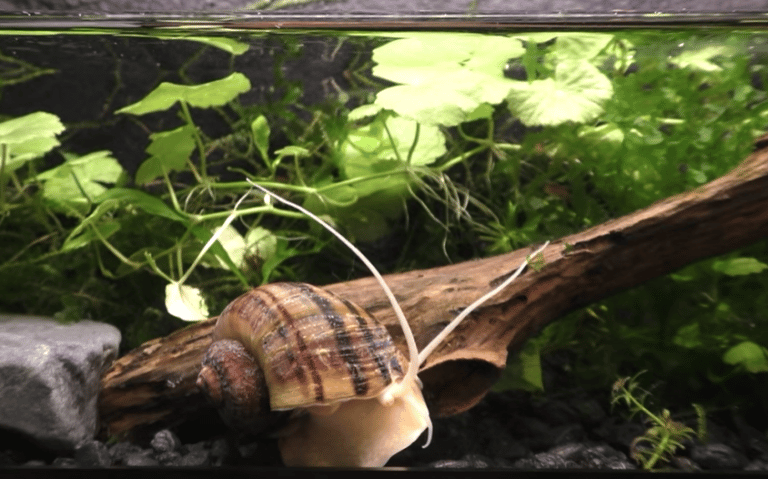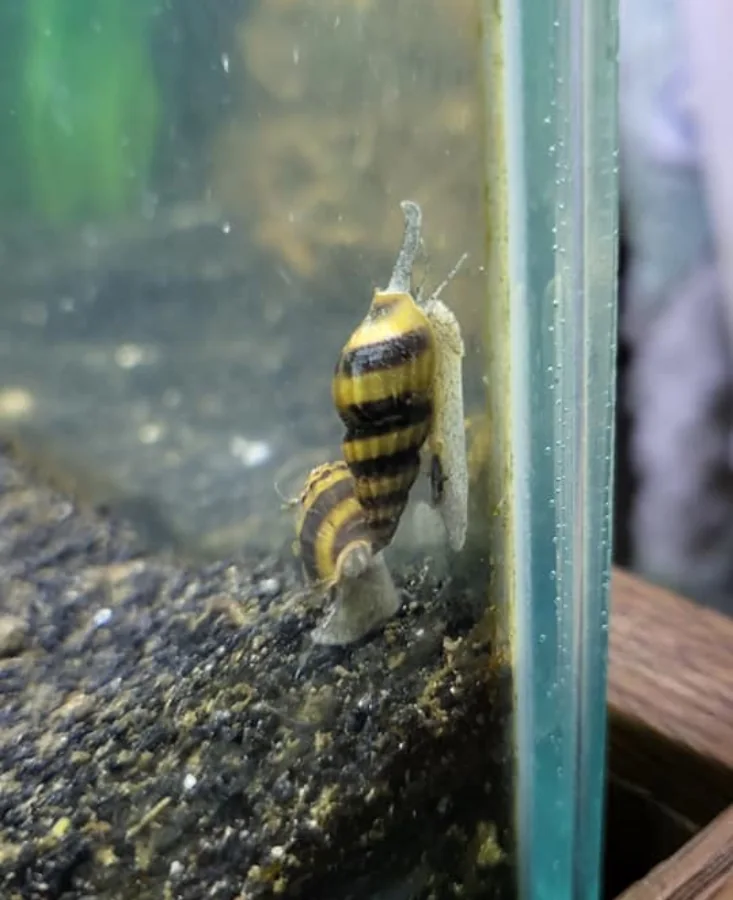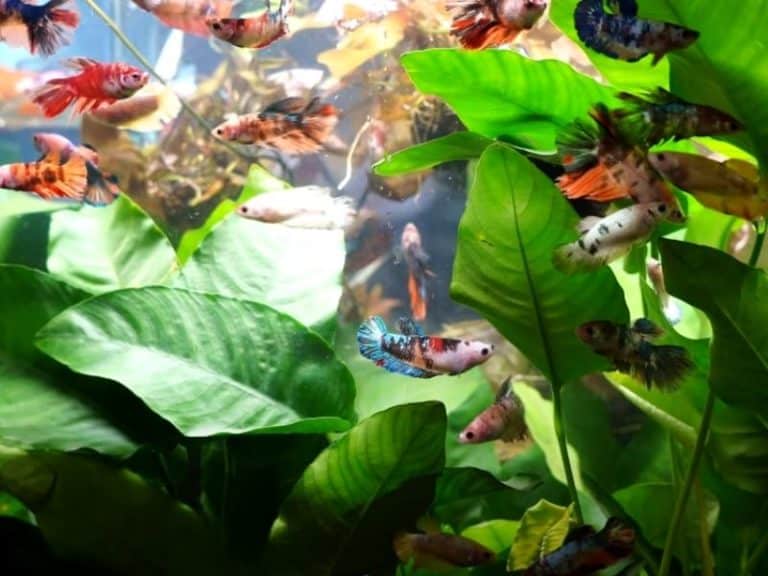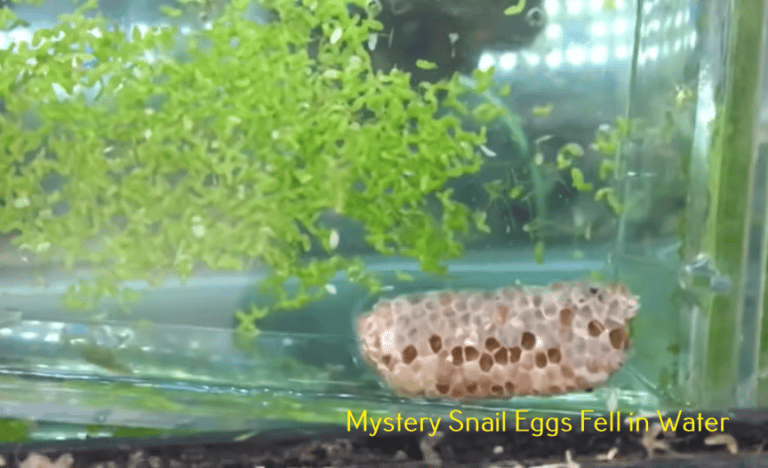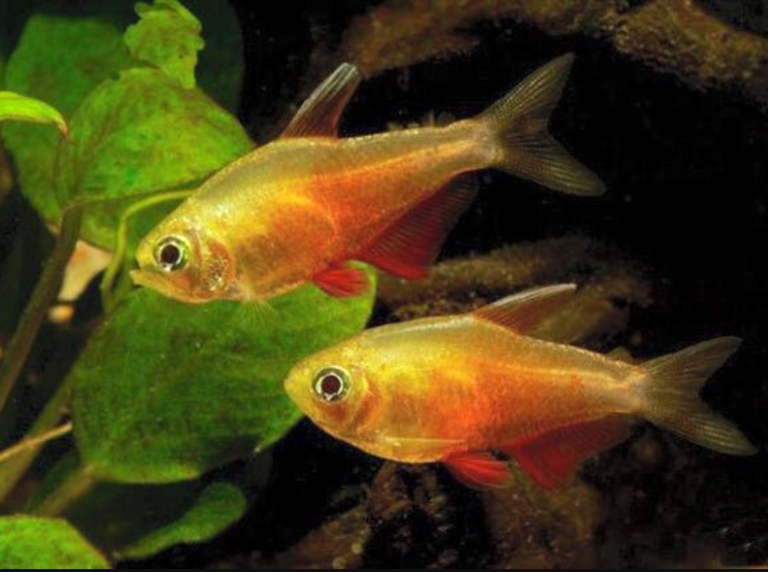Snails require calcium to develop a strong, protective shell for their soft bodies. In their natural habitat, mystery snails (Pomacea bridgesii) get their calcium from soft rocks near ponds, slow-moving streams, and lakes. In aquariums, mystery snails need calcium supplementation to build strong shells from their mantle.
Add a clean piece of cuttlebone into the mystery snail’s tank to provide a constant supply of calcium for the snails. Alternatively, grind chicken egg shells or oyster shells into a powder and mix them with your substrate so that they can release calcium into the water over a long period.
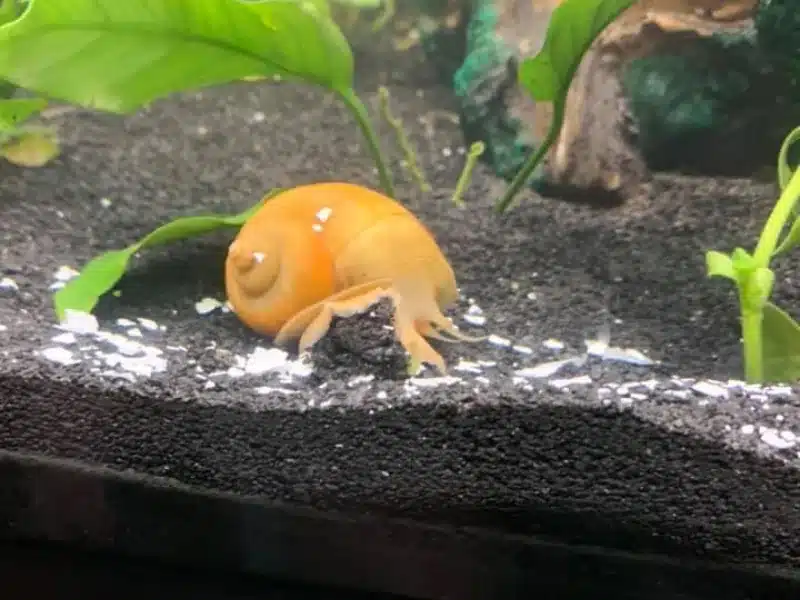
Benefits of calcium for mystery snails
The shell of your mystery snail is its protective casing. A study by Anna Galewska and Tomasz Niemiec found that “Snail shells contain from 95% to 99% calcium carbonate from calcite and argonite crystals.”1
Without enough of this mineral, you’ll notice poor shell development in your snail’s shell. I’ve discussed the signs of deficiency below. But first, here are the benefits of calcium for snails:
- Shell development and strengthening: As I’ve already pointed out, calcium is a major component required to grow strong shells in snails. Aquarium snails deficient in calcium often develop malformed and weak shells.
- Calcium aids in snail reproduction: In their research published in the Journal of Molluscan Studies Vol. 73, Allan Beeby and Larry Richmond note that “calcium limits the distribution, growth and reproduction of snails.2”
- Muscle function: Calcium is important for proper muscle function in snails, especially muscle contractions that make movement and feeding possible.
- Proper nervous system function: Lastly, calcium is needed for the proper function of the nervous systems in snails. Snails rely on this for sensing stimuli and their environments.
As a mystery snail hobbyist, I’ve observed that those deficient in calcium have a lower reproduction rate than those well-supplemented. While digging up information on this, I learned that calcium carbonate needs to be deposited in snails’ eggs to aid their development.
A lack of calcium impedes snail reproduction and increases their mortality.
Calcium requirements for mystery snails
Healthy calcium levels can be difficult to achieve and maintain in freshwater aquariums compared to saltwater ones. However, with proper cycling and pristine water conditions, your mystery snail can get all its calcium requirements from aquarium water.
Mystery snails require a calcium hardness of 70-90 mg/L to get their bodily requirements of the mineral. This is enough, provided the tank is not overcrowded with snails or other aquarium inhabitants. You’ll need to change 25% of the water every two weeks to maintain a safe tank for your mystery snails.
Some factors can affect calcium requirements in mystery snails, including the health status of your snail, water quality, the snail’s age, size, and daily diet.
For instance, younger snails require more calcium compared to older ones because of the need to grow their shell. Older snails with fully developed shells no longer need calcium for their shells.
Signs of calcium deficiency
Here’s how to tell your mystery snail is not getting enough calcium:
- Shedding of the shell
- Cracked shell
- Holes in the shell
- Shell changing color
- Shell thinning
- Loss of shell color – the shell can turn white with prolonged deficiency, commonly in albino mystery snails.
These signs are important pointers that your snail needs calcium supplementation. However, be careful not to overdose your aquarium with calcium as it can cause alkaline imbalance and calcification in your tank.
I recommend using a calcium or water hardness test kit to monitor the levels and maintain a healthy tank.
Ideally, maintain the following water parameters in the tank to keep your mystery snail healthy and happy:
| Water pH | 6.5 – 7.5 |
| Calcium | 70–90 ppm |
| Nitrate | <20 ppm |
| KH | 12-18 |
| gH | 8-18 |
| Water temperature | 68 to 82°F [3] |
How to provide calcium for aquarium snails
The main source of calcium for mystery snails is their diet. Vegetables such as kale, cucumbers, peas, green beans, and zucchini are great sources of calcium for mystery snails. However, if you notice signs of calcium deficiency in your mystery snail, you might want to consider supplementing its diet with better sources of calcium.
Here’s a list of great calcium sources for mystery snails:
1. Cuttlebone
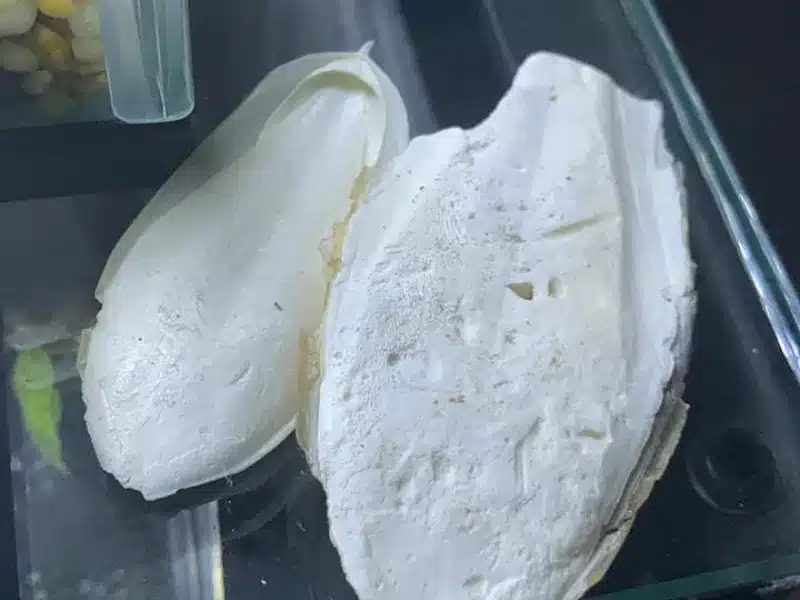
Cuttlebone contains high amounts of calcium carbonate, making it one of the best sources of calcium for aquarium pets such as snails, crabs, shrimp, and hermit crabs. The bone dissolves slowly, meaning it does not affect water parameters easily.
According to Dr. Alisa Palavenienė, a researcher at KTU Faculty of Chemical Technology, about 90% of cuttlefish bone’s composition is calcium carbonate.
This makes cuttlebone the best source of calcium for mystery snails, especially those deficient in the mineral.
If you notice signs of calcium deficiency in your snails, add cuttlefish bone into the tank. Anchor it in the tank by tying it onto substrates such as rocks and letting it sit. It’ll release calcium in the water and supplement your mystery snails with the mineral over time.
2. Eggshells
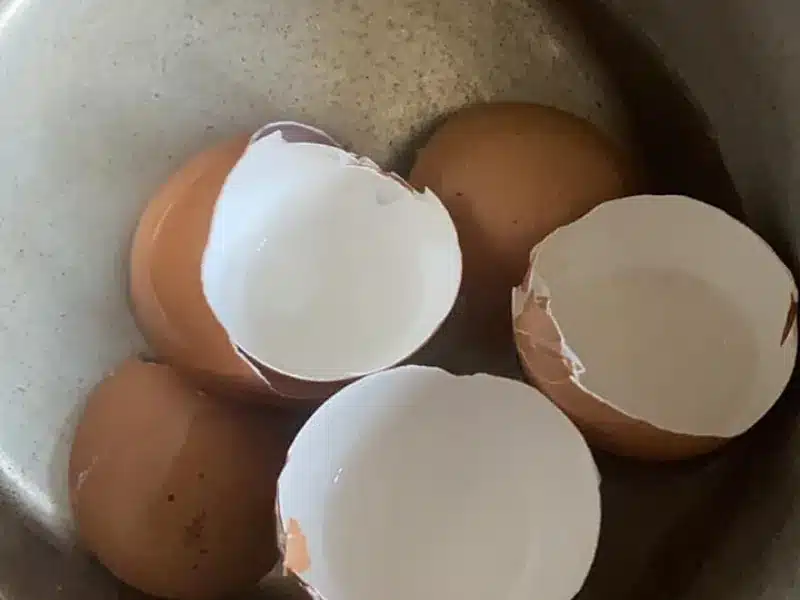
Eggshell is composed of about 95% calcium carbonate, 0.3% magnesium, and 0.3% phosphorus, making them an ideal source of calcium for aquarium snails and other inhabitants.
Boil the chicken eggshells for 5 to 10 minutes or put them in direct sunlight for 12 hours to kill harmful bacteria. Crush and grind the shells into a powder and add them into the tank so that they can disappear into the substrate and release calcium for your snails.
Note: Mystery snails will eat fish eggs in the tank if calcium sources are limited.
3. Ground coral
Ground coral is rich in calcium too. I also find it easy to add it to aquariums that need calcium by mixing it with the substrate while setting up the tank. This way, it is a continuous source of calcium for fish and snails in the tank.
If you’ve already set up your tank, you can add ground coral directly into the tank as a calcium supplement.
4. Wonder shell supplement
Wonder shell is a commercial calcium supplement for aquarium creatures. It contains a balanced blend of essential minerals, including calcium, which is great for the growth and development of healthy shells in aquarium snails.
I recommend that before you add wonder shell into your aquarium, test the water first to determine the mineral levels. Also, follow the manufacturer’s recommendations on dosage.
Typically, the size of the wonder shell you’ll add to your aquarium will depend on the size of the tank and its inhabitants.
Here’s a general guideline:
| Tank size | Wonder shell dosage |
| 5 – 10 gallons | 0.5 oz per month |
| 20 – 30 gallons | 0.75 oz per month |
| 40 – 55 gallons | 1.33 oz per month |
| 75 gallons | 2.75 oz per month |
5. Crushed oyster shells
Oyster shells are predominantly composed of calcium carbonate, making them ideal for aquariums that need calcium supplementation.
You can use crushed oyster shells to improve the water hardness of your aquarium and deliver more calcium into your tank over time.
These shells are also great for maintaining a stable kH, which also helps maintain a stable pH for your snails.
Simply crush oyster shells into a powder and mix them with the tank’s substrate. Alternatively, add the powder to the water as a remedy for calcium deficiency in mystery snails and other aquarium creatures.
6. Calcium-rich vegetables
Snails love vegetables, which are also readily available and easy to prepare. Some vegetables can be fed to snails raw, while others need to be blanched to make them soft.
Wash the vegetables to remove any fertilizer and pesticide residue, which can affect the snails. Also, cut the vegetables into small pieces to make it easy for the mystery snails to eat them.
Calcium-rich vegetables include kale, spinach, cabbage, green beans, broccoli, lettuce, carrots, zucchini, basil, and cucumber.
You can also feed mystery snails strawberries as a source of calcium.
Note that the color of veggies and food may affect the color of the snail’s poop.
Blanching vegetables for snails
Snails are little creatures with small mouths, and some veggies are too hard. Here’s how to blanch and soften the vegetables for them:
- Clean the vegetables with clean running water.
- Cut the vegetables into small pieces.
- Put the vegetables in boiling water and boil for 5 – 10 minutes. Some vegetables will require to be boiled longer than others.
- Remove the vegetables from boiling water and allow them to cool before feeding the snail.
Conclusion
Calcium is an essential mineral for mystery snails. Ensure you provide adequate calcium levels for your snails through supplementations such as cuttlebone, oyster shells, ground coral, and wonder shells. Also, feed your snails calcium-rich foods such as kale, spinach, cabbage, and broccoli to keep them healthy.
References and Citations
- 1.Rygało-Galewska, Anna & Zglińska, Klara & Niemiec, Tomasz. (2022). Edible Snail Production in Europe. Animals. 12. 2732. 10.3390/ani12202732.
- 2.Alan Beeby, Larry Richmond, Differential growth rates and calcium-allocation strategies in the garden snail Cantareus aspersus, Journal of Molluscan Studies, Volume 73, Issue 1, February 2007, Pages 105–112
- 3.Burnett, Jessica L.; Pope, Kevin L.; Wong, Alec; Allen, Craig R.; Haak, Danielle; Stephen, Bruce J.; and Uden, Daniel R., “Thermal tolerance limits of the Chinese mystery snail (Bellamya chinensis): Implications for management” (2018). Nebraska Cooperative Fish & Wildlife Research Unit — Staff Publications. 245

